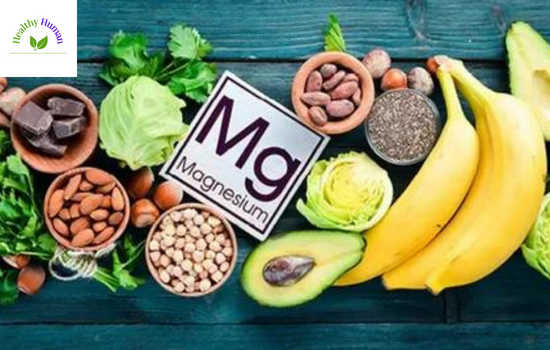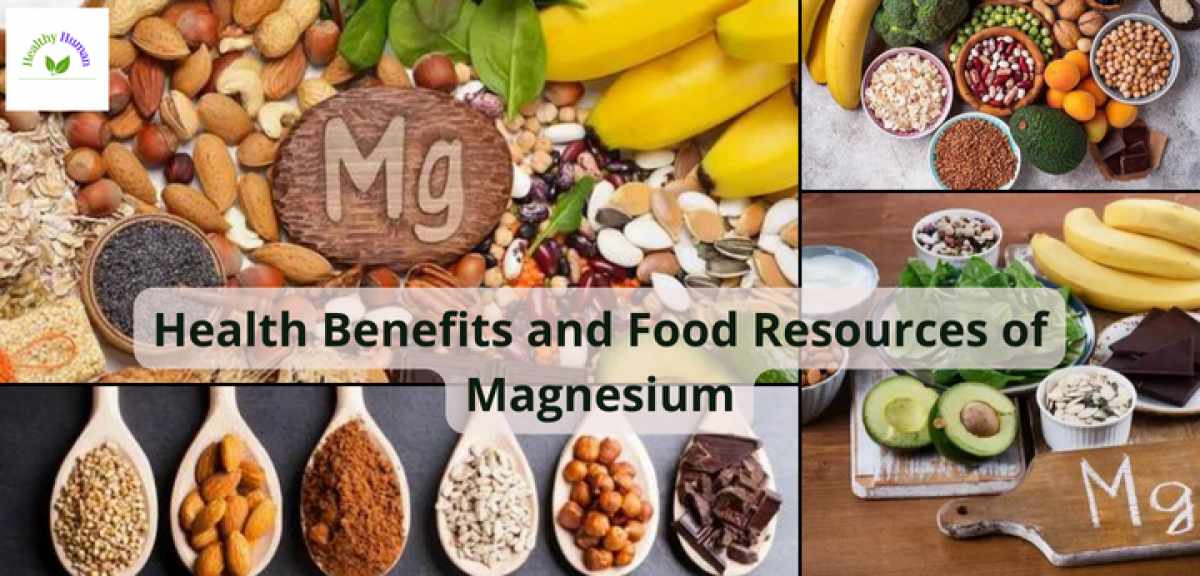Do you know, Over 300 enzyme processes in the human body involve magnesium, making it a vital element? Among its various roles are boosting the immune system, controlling blood pressure, and assisting with muscle and nerve function. Here we are going to discuss the Health benefits of magnesium and its food resources.
The body needs magnesium to carry out thousands of vital bodily functions. More than 300 metabolic processes in the body depend on it. Magnesium is essential for the healthy operation of our muscles and neurons, together with calcium. A healthy heart, strong bones, and the maintenance of normal blood sugar and blood pressure all depend on adequate magnesium levels. Therefore, Magnesium helps your body produce energy. Despite the fact that the mineral is available in many different foods and drinks, many people may not be getting enough of it. Your doctor could advise you to take magnesium supplements in certain circumstances.
Benefits of Magnesium
Health and Magnesium
The heart, bones, muscles, neurons, and other body organs all depend on magnesium to function properly. These regions malfunction if there is insufficient magnesium. A low magnesium diet or a magnesium shortage are linked to health issues. Clinical trials have produced conflicting results about the ability of magnesium supplementation to treat these illnesses, despite epidemiological research showing a link between higher magnesium diets and reduced incidence of disease. It could be because a diet strong in magnesium is frequently richer in other nutrients, which work better together to prevent disease than a pill providing just one vitamin.
Health benefits of magnesium
One of the seven important macrominerals is magnesium. People must ingest at least 100 milligrams (mg) of these macrominerals every day, which is a relatively high amount. Although individuals require fewer of them, microminerals like iron and zinc are still crucial.
Many physiological processes depend on magnesium. Therefore, Getting enough of this mineral can aid in the treatment or prevention of chronic illnesses like migraines, type 2 diabetes, Alzheimer’s disease, and cardiovascular disease.
Stronger Bones
Magnesium aids in the production of bones, which is one of the advantages and Health Benefits of Magnesium. Therefore, It protects against bone-thinning diseases like osteoporosis, bone breakage, and bone loss. Vitamin D and parathyroid hormone, two other essential components for preserving bone health, are impacted by the mineral. Both men and women who consume enough magnesium have better bone densities. Magnesium levels are lower in women with osteoporosis than in those without the disease. Results of a short study indicate that postmenopausal women who took 290 milligrams of magnesium supplement reported less bone loss than those who did not. However, more research is required.
Keep Your Heart Healthy
For the heart to work properly, magnesium is essential. The risk of heart disease, heart attacks, and hazardous cardiac rhythms is reduced when magnesium levels are adequate (arrhythmia). According to research, those with the greatest blood serum levels of magnesium were less likely than those with the lowest levels to die suddenly from a heart attack. Magnesium helps blood artery walls by causing them to relax, which in turn causes blood pressure to decrease. Even the amounts of “good” HDL cholesterol might be increased.
Preventing Migraines
Low magnesium levels have been associated with neurotransmitter release and blood vessel constriction that lead to migraines. An average of only a little bit more than 40% of debilitating migraines may be reduced by getting enough magnesium. However, If you experience migraines, find out from your doctor whether 400 to 500 mg of extra magnesium per day is good for you.
Inflammatory agent
Although inflammation is a natural bodily reaction that aids in healing, it can be dangerous when it happens excessively or unnecessarily. Diabetes, heart disease, and arthritis are just a few of the illnesses that have been related to chronic inflammation. Therefore, According to research, higher levels of inflammation are correlated with low magnesium levels. Getting enough magnesium can help reduce inflammation and the risk of developing chronic diseases.
Anxiety
Magnesium deficiency may contribute to mood disorders like anxiety and sadness.
A study found possible associations between high levels of anxiety and low magnesium levels. The hypothalamic-pituitary-adrenal (HPA) axis, a group of three glands that regulates a person’s response to stress, is partially responsible for this.
The study notes that the quality of the evidence is low and that in order to determine how effectively magnesium supplements might be able to reduce anxiety, high-quality trials must be conducted.
Could make sleeping better
Magnesium is crucial for good sleep.
Magnesium supplements have been demonstrated to help sleep. Individuals who have low magnesium levels are more likely to have sleep issues, including trouble getting or staying asleep.
In comparison to a placebo, taking supplements containing 320–720 mg of magnesium daily for up to 8 weeks reduced the time it took older persons to fall asleep and increased their overall amount of sleep, according to an analysis of research.
Similar findings from other studies suggest that taking supplements of magnesium can assist people, especially older persons, fall asleep more quickly and staying asleep longer.
Food Resources of Magnesium
Plant foods containing magnesium include legumes, dark green leafy vegetables, nuts, seeds, whole grains, and cereals with added nutrients. Fish, chicken, and meat all contain it as well.

- Cashews, peanuts, and almonds
- squash seeds
- Almond butter
- Beans (black, kidney)
- Soymilk with soybeans
- cooked Swiss chard with spinach
- potato-skinned white
- Brown rice
- Oatmeal (instant, whole oats)
- Salmon
- Poultry
- Banana
- Raisins
- a dark chocolate (at least 70 percent )
- milk and yogurt
Consume more seeds and nuts
Magnesium can be found in good amounts in nuts and seeds. About 80 milligrams of magnesium are present in an inch of almonds or cashews. That is almost 20% of the mineral recommends daily intake. The magnesium content in one-quarter cup of peanuts is about 63 milligrams. You can also meet your daily magnesium consumption goals by eating seeds. Flax seeds, pumpkin seeds, and sunflower seeds make excellent salad additions. Antioxidants, fiber, and healthy fats found in nuts and seeds promote heart health and protect against chronic diseases. Nuts and seeds help close dietary gaps and guard against malnutrition.
Choose wholesome avocados
A great food source of dietary magnesium is avocado. The amount of magnesium in one cup of avocado cubes is 44 milligrams. Additionally, they are high in potassium, fiber, folate, and good fats. Avocados can be eaten in the morning, during lunch, or evening. For breakfast, top a piece of whole-wheat toast with mashed or sliced avocado. Add avocado, either chopped or sliced, to salads. To prepare great guacamole, mash avocados and mix with diced tomatoes, onions, cilantro, lime juice, salt, and pepper. Tacos and nachos, two popular Mexican foods, go perfectly with avocado as a garnish.
Consume leafier, dark greens
Eat more spinach, a fantastic food source of magnesium, if you have a deficiency. Per cooked cup, it has about 150 milligrams of magnesium. Additionally high in calcium, potassium, and iron are dark leafy greens like spinach, kale, and collard greens. They also have good levels of vitamins A, C, and K. The vegetables edamame, potatoes, broccoli, and carrots are also high in magnesium. For instance, One-half cup of edamame has 50 milligrams of magnesium. Potatoes only contain 43 milligrams of mineral in 3 1/2 ounces. Per half cup, broccoli has 12 milligrams. The magnesium content of a medium carrot is 7 milligrams.
Consume more beans
You can prevent magnesium deficit and meet your daily magnesium requirements by eating beans. Black beans have 60 mg of magnesium per half-cup. There are sufficient amounts of the mineral in one-half cup of kidney beans (35 milligrams), white beans (67 milligrams), lima beans (50 milligrams), navy beans (48 milligrams), and cowpeas (46 milligrams). There are lots of health benefits of magnesium. Beans can be included in salads, stews, and soups. Make flavourful bean dips. In addition to being a strong source of protein, beans are also high in iron, zinc, and fiber.
Consume a lot of whole grains
Make sure the grains you consume are whole, high-fiber sources of magnesium. All three components of the grain seed—the bran, germ, and endosperm—are present in whole-grain diets. Bran, the seed’s outermost covering, is where you’ll find the antioxidants, fiber, and B vitamins. B vitamins, proteins, minerals, and good fats are all included in the germ. Because just the starchy endosperm is present in refined grains, many nutrients are removed. Choose whole grains to increase your intake of magnesium and other nutrients.
Conclusion
So, Above all, we have read about the Health Benefits of Magnesium and its Food resources. Magnesium may be a mineral that’s necessary for the best physiological performance. However, Lower risk of heart condition, kind two polygenic disease, and alternative diseases have been related to adequate atomic number 12 consumption.
Nuts, seeds, bifoliate greens, legumes, and legume products square measure all dietary sources of atomic number 12.
If you do not receive enough of this significant ingredient from diet alone, taking a supplement will assist you to fulfil your daily desires. However, Lower daily doses of 350 mg square measure are unlikely to cause aspect effects.




